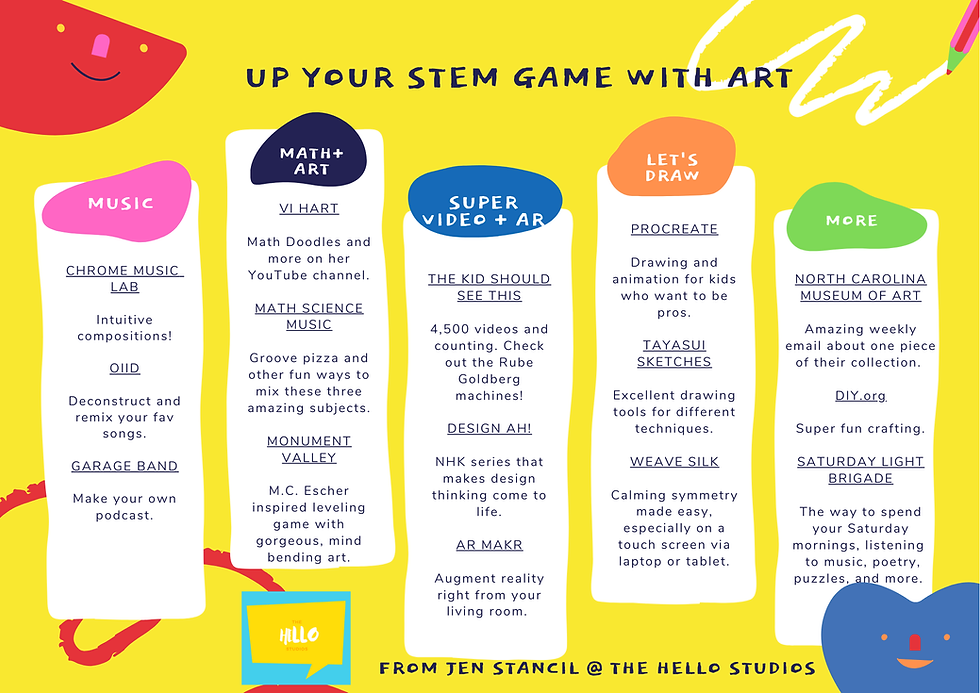Parenting Fast Forward: Why kids will lean on imagination to shape the next decade
- Jen Stancil

- Oct 13, 2020
- 3 min read
Updated: Nov 14, 2024
Welcome 2020! When your toddler gets to the end of this decade, they’ll be headed to middle school and your middle schooler – well they’ll be well into their adult life, just coming out of college. How do we prepare to raise our kids in the next decade? What tools are going to be critical to the health and wellbeing of Gen Z and those in a new generation not yet named? While I don’t have the secret recipe, I have a few key tools that I think will help.
Media Savvy
When I created the TV show, iQ: smartparent for PBS stations across the nation, I was interested in exploring the intersection of media and learning. These days, I’m not only immersed in that, but in the intersection of media and identity. Gen Z is both the most diverse, digitally savvy, connected generation ever with 96% owning cell phones and kids spending a good portion of their waking hours connected to a device. Here are the two sides of that coin.
First, consumption. This is where I have trusted a source like Common Sense Media repeatedly over the past decade and it hasn’t let me down. It’s one thing if you just want to see if Back to the Future is something your 10 and 12 year old can handle. It’s another thing to have a secret source to find out what the heck TikTok is and why it’s all your kiddo talks about. (TikTok is an app that combines Vine with Musical.ly where kids put their short videos to music and hilarity ensues.) With summer movie handbooks, searchable reviews and a ton of great advice, you and your kids can make decisions together.
Second, creation. When I speak to young people, I often remind them that media today is so democratized that anyone can use the platform to magnify their voice. Storytelling is a skill that every child in this generation is going to hone online and off. As a generation surrounded with opportunity to explain and be heard for who they are, this could be our most accepting and inclusive generation ever.
Empathy
If you have not yet read Michele Borba’s book, Unselfie, get it on your nightstand or Audible feed now. With a rise in bullying, Michele’s book explains both at a high level and in workbook-like prescriptive to dos, how empathy is the soft skill for the next decade. Michele recounts how empathy short-circuits the negative array of bombarding imagery, behavior, and environmental systems built to disconnect us from emoting with others by putting ourselves in their shoes.
Grit
The same can be said of Angela Duckworth’s focus on resilience in her book, Grit. Those of us in formal and informal education are striving to recast educational experiences that allow children to “fail forward” in their education. That means that they learn as much from their mistakes as they do from their successes and it is this resilience, paired with a concept called the Growth Mindset, that you’ll be seeing sweep across schools in the next several years.
Imagination
A few years ago, I delivered a keynote to educators, academics and parents entitled The Imagination Generation. I suggest that, in a world where many things are automated, sensory and intelligent, it’s going to be imagination that will be responsible for revolutionary leaps. So, what made the iPad (released on April 3rd, 2010) the most prolific invention of the ‘10s has everything to do with imagining what you could do or where you could go that is impossible today. That theme will continue for most of this decade if not this century. Our next revolutions are going to be built by our kids and for that, they need to be wildly imaginative, heavily inspired by making, art, role play, and their own dreams. Being a great parent involves keeping that imagination on fire as they grow so today’s kids can be the architects of a successful and bright future.
First Published in Amberly Newsletter, January 2020



